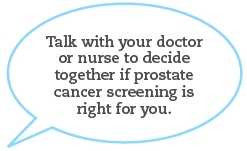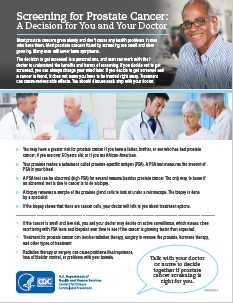Screening for Prostate Cancer: A Decision for You and Your Doctor
Most prostate cancers grow slowly and don’t cause any health problems in men who have them. Most prostate cancers found by screening are small and slow growing. Many men will never have symptoms.
The decision to get screened is a personal one, and men can work with their doctor to understand the benefits and harms of screening. If you decide not to get screened, you can always change your mind later. If you decide to get screened and a cancer is found, it does not mean you have to be treated right away. Treatment can cause serious side effects. You should discuss each step with your doctor.
- You may have a greater risk for prostate cancer if you have a father, brother, or son who has had prostate cancer; if you are over 50 years old; or if you are African-American.
- Your prostate makes a substance called prostate-specific antigen (PSA). A PSA test measures the amount of PSA in your blood.
- A PSA test can be abnormal (high PSA) for several reasons besides prostate cancer. The only way to know if an abnormal test is due to cancer is to do a biopsy.
- A biopsy removes a sample of the prostate gland cells to look at under a microscope. The biopsy is done by a specialist.
- If the biopsy shows that there are cancer cells, your doctor will talk to you about treatment options.
- If the cancer is small and low-risk, you and your doctor may decide on active surveillance, which means close monitoring with PSA tests and biopsies over time to see if the cancer is growing faster than expected.
- Treatment for prostate cancer can involve radiation therapy, surgery to remove the prostate, hormone therapy, and other types of treatment.
- Radiation therapy or surgery can cause problems like impotence, loss of bladder control, or problems with your bowels.

Talk with your doctor or nurse to decide together if prostate cancer screening is right for you.
- Page last reviewed: September 21, 2017
- Page last updated: September 21, 2017
- Content source:
- Maintained By:


 ShareCompartir
ShareCompartir
